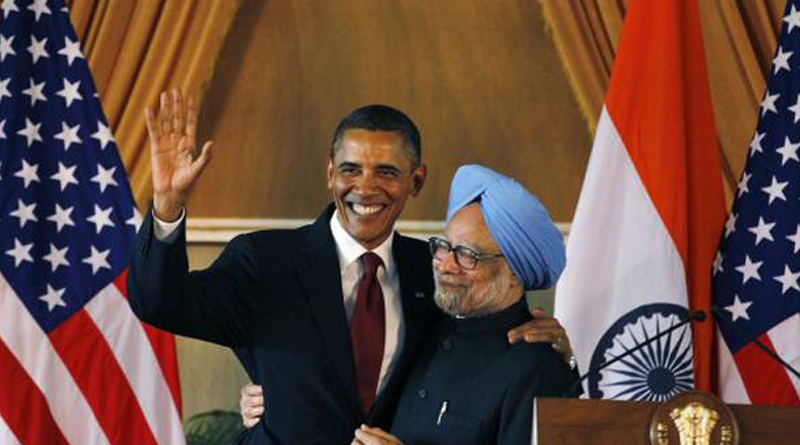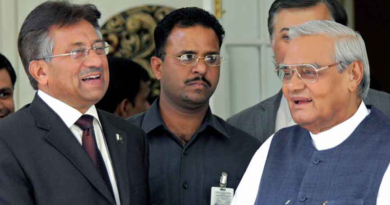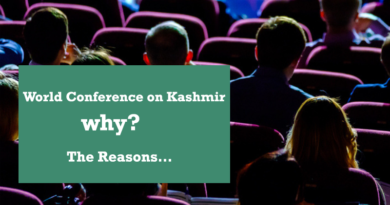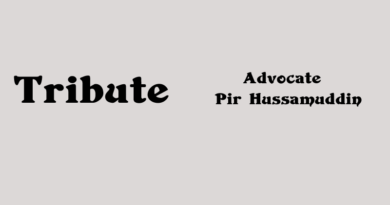Obama Signs up India for a Bigger Role to Fight Islam
President Barack Hussain Obama has come and gone. We are not going to analyze the outcome of this visit here, but only focus on some issues revolving around India’s ambitions for a higher power status, so manifestly evidenced by its overwhelming concern for a permanent seat in the United Nations Security Council (UNSC) and America’s approval of these ambitions. Since the relationship is not between two equals, the focus has to be mainly on how India is going to be used in the global power game.
China Factor
Much is being made of the U.S. trying to build India as a bulwark against China. Well, there is no doubt about that, but US concerns are much more serious, and long term in wooing India than the mere containment of China. The China factor does worry U.S., but the matter has been hyped a lot, and there are political reasons for that. We will not go into this issue here but only note a couple of points in passing:
First, the China factor – howsoever difficult – is manageable for U.S. and other dominant powers in the current World Order. Presuming for a moment that China becomes a superpower in the coming years to replace/rival the United States, it will be an in-house change as was the demise of Soviet Union. The power centre will shift from one member of the house to another; strategies may change but the civilizational direction and objectives will remain the same.
Second, having said that, it is also true that there being no one-to-one relationship between economic and political power, China’s becoming an economic superpower may or may not translate into its becoming a political super-power as well, particularly in the face of the absolute determination of the leading Anglo-Saxon axis (including UK, US, and Australia) to keep power within themselves. The aforementioned in-house change took place at the end of World War II when political supremacy of Western Civilization passed on from Great Britain to United States, but one must not forget that the erstwhile Soviet Union, despite its huge military might and political clout was not only denied any position of leadership but was ultimately eased out of the game altogether- i.e. penalised for being a contestant. So it is a long way ahead for China, that too with an uncertain future.
Obama links India’s emerging global role with the ‘issue’ of Iran
Having put the China issue in perspective, we will now look at the more profound concerns Obama had, and wanted to bring India completely inline with regard to those concerns. For this we will focus on his speech to the joint session of Indian Parliament on 8th November, 2010. Obama gave his audience a pleasant surprise in the Indian Parliament when he categorically announced that United States favours a permanent seat for India at UNSC. But that was only the beginning of the ‘good news’ – what followed was a short description of India’s responsibilities when assuming a big power status, and a lecture in clear words about how, in the words of India’s former foreign minister Jaswant Singh, India should behave when brought to the high table, how to properly handle forks and spoons. The ‘honour’ conferred on India was linked to these responsibilities, which included on top of it the ‘issue’ of Iran – the only country Obama mentioned by name in this context. Let us get some truth out of these facts:
President Obama was not handing in the UNSC seat to Indian MPs as an instant gift; he could not have. He alone is nobody to do that, there is a long procedure involved which takes many years, and who knows what the world will look like in future years. Neither was he sealing a give-and-take deal with India; such deals are better done in one-on-one or proper official meetings and strategic dialogues. It is only when one has to deliver a vital political message that a political platform like Indian Parliament is chosen, as Obama did. Holding a prize in his hand, he stood before the elected representatives of Indian people and tutored them that for a global role they need to come out of the narrow Pakistan-centric vision, and look at the wider civilizational picture and the world-order based on it, identify the real threats, and act accordingly. He mentioned Iran by name because he and other leading players of the current world order see that country as the main threat not only to US hegemony (as with China) but to their whole civilizational edifice, its so-called ‘values’ and its ‘religion’— the religion of greed and money. The threat, as U.S. and other world powers know fully well, is not an immediate military threat; for that matter currently there is no such threat to U.S. from any country after the fall of Soviet Union but Iran’s mere existence is a deep source of worry for the current global powers, and if India also wants to be a global power, it must share this worry and act accordingly, namely by partnering with the US for ‘global security’ as Obama put it. This was Obama’s political message to India’s political class. One may perhaps think that Iran was singled out because it is the only country consistently resisting pro-Israel U.S. designs in West Asia. While that is true, it is only the tip of the iceberg; there is a much deeper underlying reality which we need to look at, rather briefly, so as to fully appreciate why Obama linked the question of Iran with India’s emerging global role. Why for a country aspiring for prominence in the current World Order, should Iran be the chief security concern?
Why is Iran Considered a Threat to Present World Order?
The real worry for USA and the rest of the capitalist West is that when they look at the future of western civilization and its amoral corporate enterprise, the only obstacle they see in their way is the Islamic Republic of Iran. This has to be looked from more than one angle:
First, Iran is becoming a rallying point for all anti-imperialist and anti-colonial forces like Venezuela, Bolivia and other such small nations who detest US hegemony and the policy of meddling into others’ affairs. How long they will be able to keep their company with Iran is a different matter, and should not make us underestimate the significance of this phenomenon.
Second, the Islamic Republic came into existence on the basis of Islam, represents the authentic expression of Islam in political terms in this day and age, has established itself firmly by putting in place a solid and vibrant institutional framework, and above all has successfully survived the combined might of all the forces of ‘kufr’ and ‘nifaq’, hell-bent on destroying it right from the inception, and has grown from a position of strength to greater strength. As such, the mere continuation of Iran as vanguard of the Islamic movement has tremendous potential to change the condition of the Muslim world and, by implication, the world in general. Without going into details here, let us briefly note two very positive developments in this regard. One is the Iran’s solid relationship with Hamas in Palestine, and with Hizbullah in Lebanon. The other development is the changing politics of Turkey, reflected, among other things, by its growing relations with Iran with a clear srategic content, preferential ties with Hamas, preferring them over the pro-Isreal PLO faction led by Mahmoud Abbas, and moves, howsoever small, to return to its Islamic legacy. All these changes are of seismic proportions with far reaching implications, given the particular context of Turkey’s political history. Apart from these two developments, the power equations in the region(around Iran) are changing, and sheikhdoms in its neighbourhood where dynasties have been ruling for years and keeping people in dark, are facing maximum heat. Saudi regime, the main American proxy in the region has been from the start, desperately trying to contain the growing influence of the Islamic movement led by Iran. Earlier on, it financed the Saddam led war against Iran in 1980’s and has since been busy promoting hatred among Muslims via lavish financing of pro-Saudi elements worldwide. The Saudi regime knows and appreciates very well how vital India’s cooperation to contain Iran will be. The King made a high profile visit to India in 2006, and Indian Prime Minister when returning the visit early this year was given a red carpet welcome. It is pertinent to note that among the first to very warmly welcome Obama’s support for India’s UNSC berth was none other than the Jeddah based ‘Arab News’ an English daily owned by Saudi Research & Marketing Group (SRMG), a Royal Family publishing business headed by Prince Faisal bin Salman bin Abdulaziz Al Saud. The ‘Arab News’ carried an editorial hailing Obama’s declaration as ‘perfectly fair and one that many states around the world endorse’ (10/11/10).
Third, Iran with a vibrant and – in an essential sense – original democracy i.e. not copied from West but fundamentally different from it, and inspired by Divine values, clearly represents the contemporary civilizational reality of Islam. One has to understand that the West’s consumerism, greed and exclusive focus on one’s material wellbeing at the cost of spiritual growth has created a deep void amongst its people and those following its ways elsewhere. A spiritual void has come to exist which in USA and Western Europe such Hindu cults like Rama Krishna and Yoga missions are trying to fill. Forget about the political leaders, the modern man(meaning human being, man or woman) finds himself deeply frustrated, earning to live and living to earn, he finds himself locked in a vicious circle with life having no purpose, external to, and higher than itself. The sublime teachings of Islam, no doubt, are, as ever, capable of winning the hearts and minds of people, but the social reality now prevalent in most of the Muslim countries stands in sharp contrast to those teachings. Societies claiming to be governed by Islam where woman are not allowed to drive a car, caste a vote, go to hospital alone even if dying of labour pain, do not leave a good image, let alone present a civilizational alternative for this modern frustrated man. He will continue to be caught up between the devil and the deep sea, living the ‘civilized’ life as defined by the West or else retiring to some ascetic camp. After all, we must not forget that the presently dominant western civilisation originated as a colonial movement of loot and plunder but introducing itself as a ‘civilizing mission’, it set about ‘teaching’ people how to live a modern life. By now a range of institutions have been devised to act as universal regimes to grade societies as developed, underdeveloped etc. with the western model as the yardstick. One would be given to think that if one has to live a civilized, modern, cultured life with freedom, one has to conform to what the West calls its ‘lifestyle’. It must be noted that the topmost commodity that the West markets to the rest of the world, is this ‘lifestyle’. This situation cannot change a fundamentally different alternative is presented to people. This cannot be a message; it has to be a reality – a real and functioning system. The Islamic Republic of Iran represents precisely that. It gives a message to the world, not through words but through the medium of example, hence loud, authentic, and credible, that in this day and age Islam can create healthy and progressive societies of people living civilised and morally upright lives with economic stability, a life where one can enjoy all God-given freedoms while happily engaging in all the worldly activities under proper Divine guidance. This is an extremely powerful message with its own dynamic and poses a long-term but credible threat to the predominance of Western Civilization. The West, being exceptionally future-conscious, fully understands it and as a policy to counter it, keeps Iran constantly entangled in issues like nuclear bomb or support to terrorism, none of which are or ever were, the core issues because Iran is not going to bomb the world and kill innocent people. Islam, as the Supreme Leader Imam Khamenei has categorically declared, prohibits that.
Obama was only familiarizing the Indian political class of the real tasks lying ahead in navigating the ship of the current World Order. India cannot be the Captain but it has to be active and always at the beck and call of the captain. What a great irony it is then that this ship is already showing the signs of sinking. How apt are the Quranic words: “So weak are (both) the seeker and the sought! “(22:73)
***
Dr. Syed M Inayatullah Andrabi is a well-known figure in the circles of political Islam. Born in Srinagar, the capital city of Indian Held Kashmir, Dr Andrabi has been intimately involved at the intellectual level with the global politics and political issues since his student days in 1980 at Pune (India), where he completed his Ph.D. in Linguistics in 1983 at the Centre of Advanced Study in Linguistics, Deccan College, University of Pune, Pune, India. Upon completing his doctorate he returned home to join the University of Kashmir, first on a post-doctoral fellowship and later as faculty, but could not continue because of the deteriorating security situation in Kashmir, and had to move to United Kingdom in 1994 where he continues to live since along with his wife and five children.




